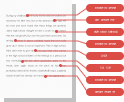批改及润色体验馆想知道您的作文、口语、文书将如何被我们的专家批改及润色吗?
 马上体验口语批改
马上体验口语批改 马上体验作文批改
马上体验作文批改 马上体验文书润色
马上体验文书润色Reading:
Many consumers ignore commercial advertisements. In response, advertising companies have started using a new tactic, called “buzzing." The advertisers hire people,buzzers,who personally promote (buzz) products to people they know or meet. The key part is that the buzzers do not reveal that they are being paid to promote anything. They behave as though they were just spontaneously praising a product during normal conversation. Buzzing has generated a lot of controversy, and many critics would like to see it banned.
First, the critics complain that consumers should know whether a person praising a product is being paid to praise the product. Knowing this makes a big difference: we expect the truth from people who we believe do not have any motive for misleading us. But with buzzing what you hear is just paid advertising, which may well give a person incorrect information about the buzzed product.
Second, since buzzers pretend they are just private individuals, consumers listen to their endorsements less critically than they should. With advertisements in print or on TV, the consumer is on guard for questionable claims or empty descriptions such as "new and improved." But when consumers do not know they are being lobbied, they may accept claims they would otherwise be suspicious of. This may suit the manufacturers, but it could really harm consumers.
And worst of all is the harmful effect that buzzing is likely to have on social relationships. Once we become aware that people we meet socially may be buzzers with a hidden agenda, we will become less trustful of people in general. So buzzing will result in the spread of mistrust and the expectation of dishonesty.
Listening:
Hi, my name is Bill. Um, I was talking your professor in the subway about the great phone service that I was using. And it turned out we’re both interested in marketing. So he asked me to talk in his marketing classes. You see, I am a buzzer, part time, you know. During the day, I’m a student just like you. Now, I read that piece attacking buzzing, it is really misleading. How would it describe buzzing leading a lot, and gives a wrong impression?
First, it makes it sound like buzzers don’t tell the truth about the products they’re buzzing. That’s not true. How buzzing works this. Companies find people who use their products and who really think product is good. So buzzing is not like ordinary advertisement where an actress is paid to read some lies. Um, yes, I get paid for telling you what I am thinking, but you get the truth from buzzers. I really do think my phone service is great. That is why the company hired me.
Second, the reading makes it seem that when a buzzer talks to someone, the person believes whatever they hear from the buzzer. Not true. In fact, the opposite is true. People I talk to ask a lot of questions about the products I buzz, that is about the price, service and how long I used the product. If I don’t have good answers, they won’t buy the products.
Finally, if you believe what you read, buzzing will destroy civilization, that is stupid. If a product is bad, the company can’t recruit buzzers. So what you get from a buzzer is not only sincere but is likely to be about a good product. If you try the phone service I use, you’re gonna love it. So people who try buzd open up to people.
Answer:
As stated in the reading, many critics propose that buzzing be banned. Yet a buzzer, Bill, who disagrees with these critics, argues for buzzing in three important aspects.
First, he asserts that the point made in the reading, that buzzers don’t tell the truth, is false. Although buzzers are paid by companies, he states, they are actually previous users who have enjoyed the product and willing to share their real thoughts with others.
Second, he argues against a buzzers’ role in misleading consumers as shown in the reading. He states that consumers remain clear and skeptical while being buzzed. They ask questions about details such as price, service and the buzzer’s familiarity before drawing their final decision according to the responses.
Third, he says that the article’s claims about the harmful effects imposed by buzzing on civilization neglects to inform the reader that buzzers are only employed to promote worthy products and to leave consumers a nice experience, result of which is to improve society as a whole.
 马上体验口语批改
马上体验口语批改 马上体验作文批改
马上体验作文批改 马上体验文书润色
马上体验文书润色北京创新伙伴教育科技有限公司是国内一家留学一站式服务品牌,以出国考试,留学申请和海外服务为核心,为用户提供一站式的留学服务。并以翻转课堂为产品核心,基于自主研发的 SMART 智能教学系统,打造 "学、练、改、测、评" 的陪伴式“管”式动态学习,全面覆盖线上、线下和移动学习以及五大出国考试。